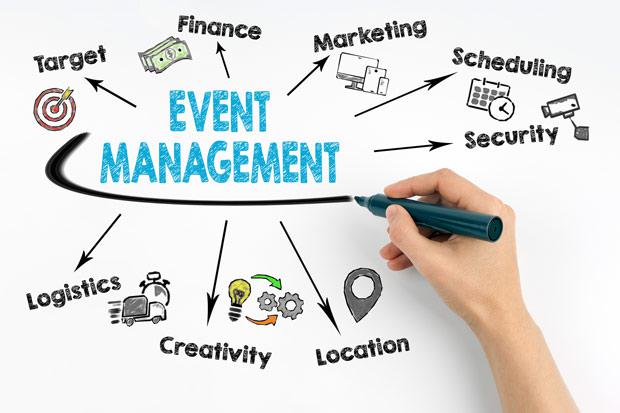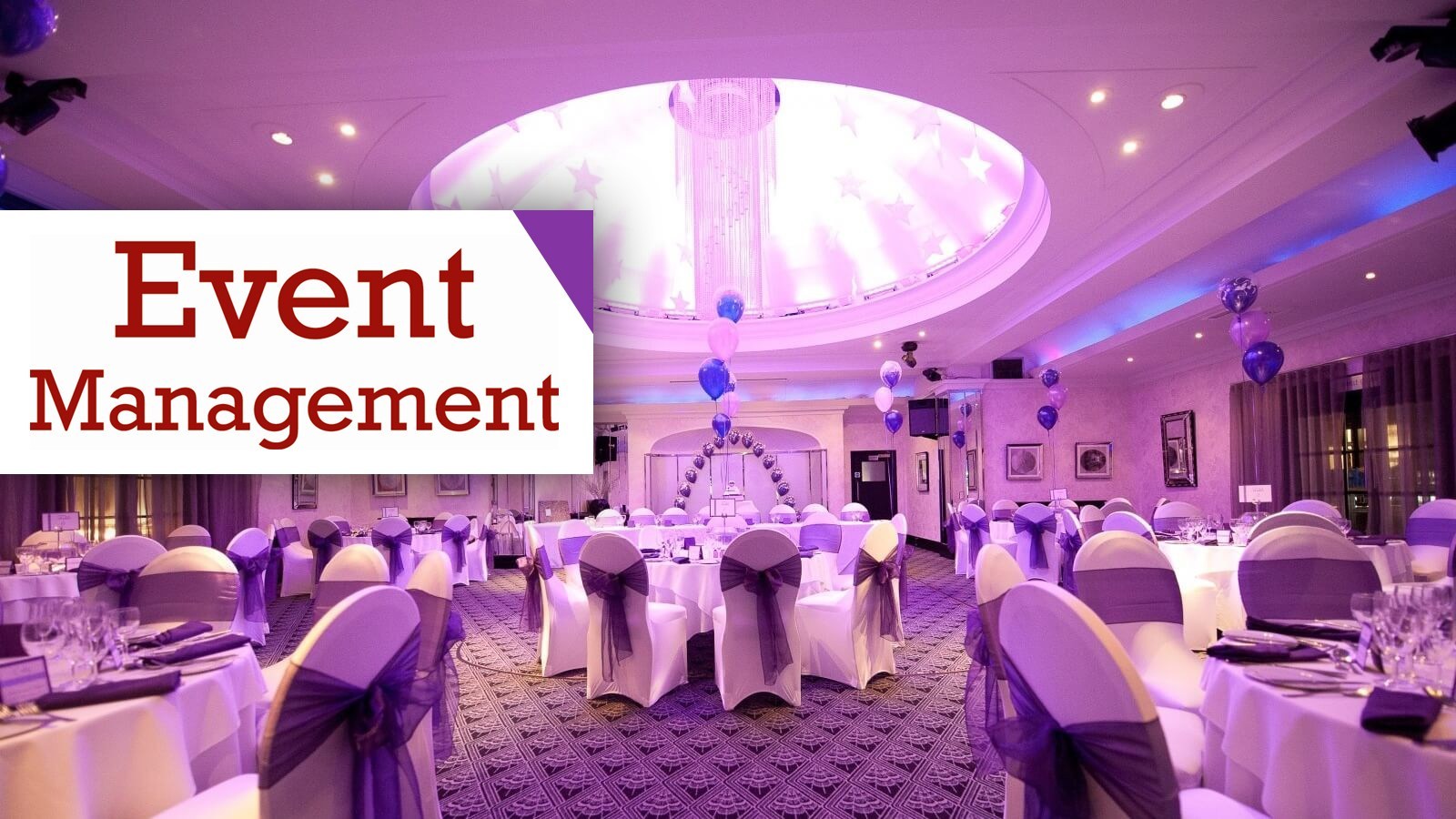Discover the Secrets to Effective Events Administration Via Comprehensive Providers Provided
Effective occasions monitoring calls for a strategic strategy. It involves understanding event objectives, choosing the best venue, and effective budgeting. Additionally, effective marketing and smooth logistics play crucial functions. Involving participants with interactive experiences can raise the overall influence. Evaluating success and Event responses is just as important. Each aspect interconnects to produce memorable occasions. What are the vital components that genuinely make an event stand out?
Comprehending Your Event Goals
Clearly specifying occasion goals is necessary for successful occasion administration. Establishing clear objectives offers a framework for all intending activities and decision-making procedures. Event planners have to determine the function of the occasion, whether it is to inform, commemorate, or advertise a services or product. This understanding forms every aspect, from the target audience to the budget allotment.
Additionally, particular objectives promote reliable communication among stakeholders, guaranteeing that everybody is aligned in the direction of a typical vision. By articulating quantifiable end results, organizers can evaluate success post-event, permitting consistent improvement. A distinct objective helps in prioritizing resources and jobs, improving efforts in the direction of achieving wanted results. In general, understanding occasion objectives is not simply a formality; it is a foundational aspect that drives the success of any kind of occasion, significantly influencing its general effect and performance.
Selecting the Right Place for Your Event
Selecting the suitable venue is vital for an event's success. Secret variables to take into consideration consist of the venue's capacity to accommodate visitors, its availability for guests, and the general atmosphere that lines up with the event's theme. By meticulously examining these aspects, occasion organizers can create a memorable experience that fulfills their goals.
Assessing Place Capacity Demands
Choosing the proper location for an occasion pivots on a detailed analysis of capability demands. Event coordinators should initially figure out the expected number of guests, as this significantly affects venue selection. A location that is as well tiny can bring about overcrowding, while one that is exceedingly large may reduce the event's atmosphere. Organizers must additionally think about the type of occasion, as different celebrations require different spatial plans, such as cinema, class, or banquet arrangements. Additionally, it is necessary to represent additional area for staging, audio-visual devices, and providing services. By examining these variables, occasion supervisors can ensure that the picked location not only fits guests pleasantly but additionally improves the overall experience for everybody entailed.
Area Accessibility and Logistics
While the location's ability plays a vital duty in occasion planning, its ease of access and logistics are equally crucial for guaranteeing a successful gathering. A well-chosen place needs to be easily obtainable by different transport approaches, consisting of public transportation, taxis, and auto parking centers. This ease of access permits participants to get here without inconvenience, boosting their overall experience. Furthermore, the venue's format ought to promote smooth activity, especially for those with flexibility obstacles. Logistical factors to consider, such as establishing audio-visual devices and catering services, should additionally be factored in to stay clear of interruptions. Ultimately, prioritizing ease of access and logistics not just promotes an inviting environment yet also contributes greatly to the occasion's success and participants' contentment.
Ambiance and Aesthetic Allure
The ambiance and visual appeal of a location play a crucial function in setting the tone for an event, influencing participants' emotions and general experience. An appropriate venue enhances the thematic components of the occasion, whether it's a company gathering, wedding celebration, or social event. Elements such as lighting, format, and design contribute significantly to producing a welcoming atmosphere. For example, a historical building might stimulate fond memories, while a modern-day room can inspire advancement. Furthermore, the place's environments, including sights and outside rooms, can even more boost the experience. Eventually, choosing a place that aligns with the occasion's objectives and wanted mood is necessary for successful events administration, making sure that visitors leave with lasting perceptions and memories.

Budgeting: Allocating Resources Efficiently
Reliable budgeting is essential for effective event management, as it assures that resources are designated in a manner that makes the most of impact while lessening waste. Establishing a detailed spending plan entails determining all potential prices-- location, event catering, amusement, and logistics-- to develop a realistic financial framework. By evaluating the top priorities and objectives of the occasion, supervisors can allocate funds efficiently, making sure important elements get sufficient financial investment.
Normal surveillance of expenses throughout the planning procedure is crucial to stay within budget and make needed adjustments. Making use of devices such as spread sheets or budgeting software program can streamline this process, enabling real-time tracking and forecasting. Involving in arrangements with suppliers can lead to cost savings without compromising high quality. Ultimately, reliable source appropriation with thorough budgeting contributes to the total success of an event, creating remarkable experiences while sticking to financial restrictions.

Advertising Your Event Properly
Effective marketing is necessary for the success of any type of event, starting with the recognition of the target audience. Making use of social networks platforms enables for broader reach and involvement, while developing compelling material records interest and motivates involvement. Together, these approaches develop a foundation for impactful occasion promotion.
Target Target Market Identification

Social Media Site Promotion
Social network acts as an effective device for occasion promo, enabling organizers to reach a huge target market with minimal cost. By leveraging platforms such as Extra resources Facebook, Twitter, Instagram, and LinkedIn, occasion managers can produce targeted campaigns that link with possible attendees. These systems enable for the sharing of occasion details, updates, and engaging visuals, which can substantially increase exposure. Hashtags and partnerships with influencers further improve outreach efforts, attracting diverse demographics. In addition, social media sites promotes real-time communication, enabling coordinators to respond to questions and feedback immediately. This prompt involvement cultivates a feeling of community and expectancy bordering the occasion, ultimately adding to greater attendance prices and an effective event administration technique.
Involving Material Creation
Creating appealing content is crucial for marketing an occasion efficiently, as it captivates the target market and encourages involvement. Quality material can take different forms, including blog posts, videos, infographics, and social media sites updates. Each item should convey the event's worth, highlighting vital audio speakers, activities, and special experiences. Consistency throughout platforms strengthens brand name acknowledgment and cultivates audience trust.
Additionally, incorporating storytelling methods can stimulate emotions, making the event much more attractive and relatable. Making use of clear phone call to action prompts potential attendees to sign up or share info with others. Furthermore, leveraging user-generated web content, such as testimonies or images from previous events, can boost credibility and create a sense of neighborhood. Ultimately, engaging material is a cornerstone of effective occasion advertising techniques.
Logistics: Ensuring Smooth Workflow
Logistics is the backbone of successful occasion administration, guaranteeing that every detail aligns perfectly to develop a memorable experience. This crucial element encompasses different elements, including venue selection, transportation, devices purchase, and on-site sychronisation. Reliable logistics planning begins long before the event day, calling for meticulous scheduling and source allowance.
A well-organized logistical structure facilitates smooth interaction among suppliers, team, and guests, reducing possible disturbances. This includes handling timelines for arrangement, making sure that audiovisual equipment is practical, and collaborating providing services. Furthermore, backup plans need to remain in place to deal with unanticipated situations, such as severe weather or technical failures.
Engaging Attendees With Interactive Experiences
How can event organizers transform a standard Event into an unforgettable experience? By incorporating interactive components that involve guests on several levels. This might include hands-on workshops, live demonstrations, my latest blog post or immersive innovation such as virtual fact. These tasks not just promote passion but also foster networking possibilities amongst individuals.
Organizers can use gamification techniques, where guests contend in difficulties or tests associated with the occasion's motif. Such activities enhance engagement and make the experience much more memorable. Additionally, incorporating audience response systems permits real-time responses and communication, which can make individuals feel much more purchased the occasion.
Creating spaces for informal discussions, such as lounges or breakout areas, better urges communication. By prioritizing these interactive experiences, event organizers can grow a vibrant environment, guaranteeing guests leave with useful connections and long-term impacts, inevitably boosting the general success of the occasion.
Assessing Occasion Success and Event Feedback
After cultivating an appealing setting with interactive experiences, evaluating the event's success becomes vital. This procedure includes gathering quantitative and qualitative information to analyze participant complete satisfaction and general effect. Studies and feedback types are important devices, allowing participants to share their point of views on different aspects, such as content significance, speaker efficiency, and logistical setups.

Examining presence metrics, engagement degrees, and social networks communications likewise provides crucial understandings. This data allows event planners to determine weak points and staminas, helping with educated choices for future events. In addition, follow-up meetings with crucial stakeholders can discover deeper point of views on the event's efficiency.
Eventually, collecting feedback not only measures success yet likewise cultivates a society of continual improvement. By focusing on evaluation, event supervisors can boost their methods, ensuring that each Event goes beyond or fulfills individual expectations while attaining organizational objectives. This commitment to reflection strengthens the foundation for future successful occasions.
Regularly Asked Concerns
What Are the Important Abilities for an Occasion Manager?
Crucial skills for an event manager consist of strong interaction, organizational capacities, analytical capacity, time administration, creative thinking, budgeting knowledge, leadership qualities, and adaptability - Charlotte Event Companies. These skills allow efficient sychronisation and execution of effective occasions throughout numerous settings
Just How Can Technology Enhance Occasion Management Provider?
Innovation enhances event administration services by improving planning processes, facilitating interaction, automating tasks, and giving information analytics. These developments enable event managers to boost effectiveness, engage attendees, and produce customized experiences, inevitably resulting in successful events.
What Licenses or permits Are Usually Needed for Events?
Commonly, occasions need authorizations such as public setting up, alcohol licenses, health and wellness authorizations, and noise authorizations. Requirements vary by location, occasion kind, and dimension, demanding cautious planning to assure conformity with neighborhood guidelines.
Just how Do You Deal With Unanticipated Obstacles Throughout an Event?
To manage unanticipated difficulties during an event, effective planners keep adaptability, connect quickly with groups, and develop contingency plans - Charlotte Event Companies. Quick problem-solving and adaptability warranty that interruptions are handled efficiently, decreasing effect on the event's success
What Are the most effective Practices for Post-Event Follow-Up?
Post-event follow-up best techniques consist of sending out thank-you notes, gathering responses via studies, examining event success metrics, and sharing highlights on social media sites. This technique fosters connections and aids in the preparation of future events.
Plainly defining occasion purposes is important for successful event monitoring (Charlotte Event Companies). Event planners have to recognize the function of the occasion, whether it is to enlighten, celebrate, or promote an item or service. Event coordinators have to initially figure out the anticipated number of participants, as this considerably affects venue selection. Integrating storytelling techniques can stimulate emotions, making the occasion much more appealing and relatable. Typically, occasions call for authorizations such as public assembly, alcohol licenses, wellness and security licenses, and sound authorizations